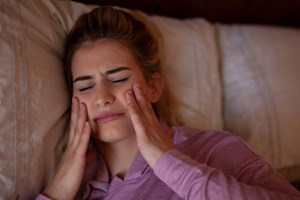How Covid-19 stress is causing a rise in bruxism
Published: 18/08/2020
The International Committee of the Red Cross reported in June this year that the global pandemic may increase stress exponentially – and patients' teeth are paying the price.
Stress can cause significant harm to the teeth and surrounding facial structures through teeth grinding as celebrity dentist and expert in the treatment of advance tooth wear, Dr Ahmed Hussein and cosmetic dental surgeon and facial aesthetic trainer, Dr Zainab Al-Mukhtar explain.
Studies have suggested that as many as six million Brits experience bruxism – however, patients are often only made aware that they are grinding or clenching at a dental check-up.
Dr Zainab said: 'I can tell at a glance if a patient is likely to be grinding heavily on their teeth, before even looking in their mouth. They often have enlarged jaw muscles. Clenching and grinding the teeth daily is effectively giving a rigorous, frequent workout for the jaw muscles, which grow in size as a result. Some patients even complain that their widened jaw leaves their face looking larger than they would like and more "square" in appearance. Some women feel this creates a more masculine appearance.
Dr Ahmed added: 'In addition, teeth grinding over time can wear away at the dental enamel. Worn teeth are shorter in height, leading to changes in the bite so patients may present with a shorter facial appearance and a weakened support structure for facial tissue. This in turn can contribute to premature facial sagging, wrinkling and ageing around the mouth, another clue that the patient may suffer with bruxism.'
The exact cause of bruxism is unknown, but it is accepted that there are multiple causes, with stress and anxiety being major contributory factors.
Dr Ahmed added: 'The past few months have been a challenging, stressful time for us all, and I am in no doubt that this is playing out in our patients’ mouths. A higher proportion than ever are presenting with symptoms of bruxism including chipped teeth, headaches, enlarged jaw muscles. When I explain to them that I can see that they grind or clench their teeth, most of them have no idea that they are doing this to themselves and are keen to seek treatment that reduces their grinding and helps to correct the harm being caused.'
Treating bruxism
From a clinical perspective, helping to manage bruxism is not always straightforward. Many patients are fitted with a tailor made night-time guard by their dentist to help to reduce the wear and tear they are inflicting on their teeth. Dr Ahmed explained; 'First of all, we assess the function of the teeth, as it is so important to have a stable bite so that the teeth will no longer be gliding against each other in a traumatic way. If the bite stability has been lost then we need to rehabilitate this and recreate space for restorations to sit and function in a harmonious environment. This will also reduce risk of further tooth wear.'
Additionally, they sometimes need to address the other effects of bruxism, affecting facial shape.
'At our clinic we have found that one of the most effective ways to counter the outward effects of excessive tooth grinding and clenching on the face is using neurotoxin,' said Dr Zainab.
'After we first tackle the issues inside the mouth, we can look at neurotoxin treatment which is particularly effective as it blocks signals from the nerves to the muscles. In the case of bruxism, it can help to reduce the activity in the jaw muscles (the masseter) which in turns reduces the clenching forces on the teeth, lessening the damage. Treatment results are not experienced instantly, it can take a few weeks for the full effects to be experienced, and they last four to six months.'
Treating the effects of Bruxism
When it comes to treating the effects of bruxism, the damage caused is often more than skin deep. Dr Ahmed explained: 'Prolonged clenching and grinding can cause the teeth to wear away considerably faster than they would through the normal aging process. I have seen patients wear their teeth to very small stumps through years of grinding. Many patients approach me keen to reverse the worn down appearance in the smile as a result of their bruxism.
'The evolution of aesthetic dentistry has enabled dentists to reduce signs of wear, and even lengthen shortened teeth through expert use of composite bonding. Composite bonding is the application of composite resin to the surface of the tooth to restore it, without damaging anymore of the residual tooth structure. It’s a simple, inexpensive cosmetic dental procedure that is usually completed in a single visit. In addition to improving the aesthetic of the smile, the lengthening of shortened teeth can, for many, have the additional benefit of increasing the structural support of the facial tissue reducing the appearance of facial sagging around the mouth.'
They concluded: 'We are hopeful that the rise in bruxism cases we are currently experiencing is a blip and will decrease in the next few months, but are primed and ready to help as many as we are able.'
• Follow Dr Ahmed Hussain on Instagram @dr.ahmedsmiles
• Follow Dr Zainab Al-Mukhtar on Instagram @drzainabaesthetics
Author: Julie Bissett













